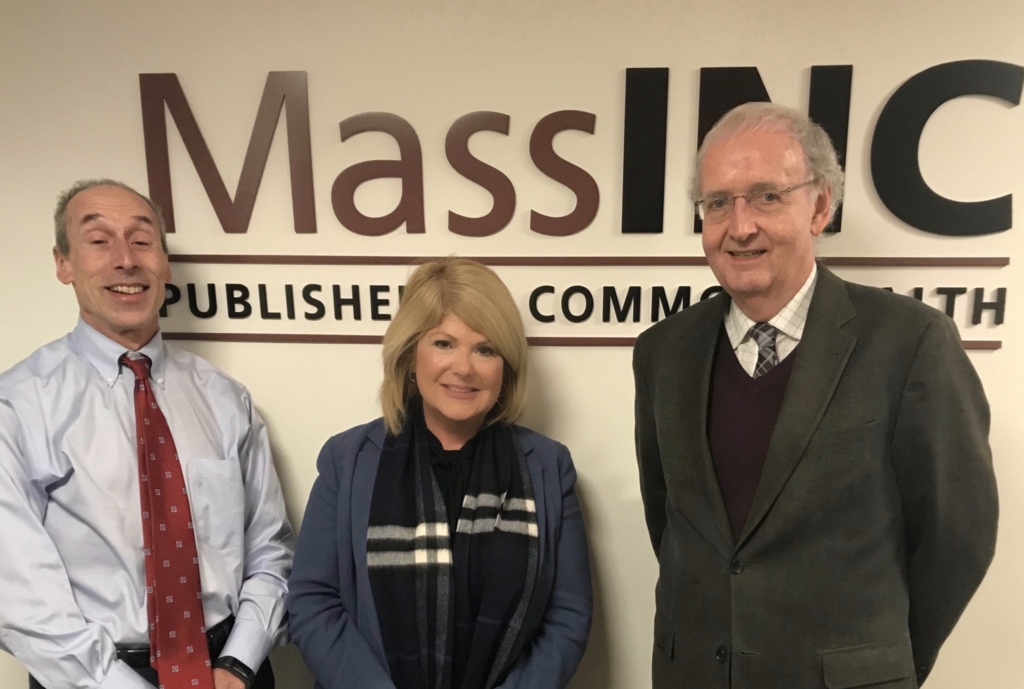PARTNERS HEALTHCARE is moving to eliminate surprise billing, where consumers receive large, unexpected hospital bills after unknowingly being treated by a doctor who doesn’t accept their insurance.
The Partners policy on surprise billing surfaced during a CommonWealth Codcast interview with Lora Pellegrini, president and CEO of the Massachusetts Association of Health Plans.
“Partners has told me they are going to stop this practice,” she said. “The physicians will be either employed or contracted through Partners. That’s an important example for all other providers in this state.”
A Partners spokesman, Rich Copp, confirmed that the state’s largest hospital system is moving to eliminate surprise billing. “That’s our goal and we’re moving toward it,” he said.
Pellegrini, interviewed by the Health or Consequences hosts John McDonough of Harvard’s T.H. Chan School of Public Health and Paul Hattis of Tufts University Medical School, talked about a wide range of issues, including rising pharmaceutical costs, the shift toward primary and behavioral health care, the disparity in hospital pricing, and Sen. Elizabeth Warren’s “scary” conversion to Medicare for All.
Perhaps the newsiest element of the discussion centered on so-called facility fees and surprise out-of-network charges.
Pellegrini said hospital facility fees started out as charges assessed when patients visited an office on a hospital campus that contributes to the campus’s overhead costs for such things as parking and security. She said the fees, often in the $400 to $500 range, are now being collected by facilities that have little or no connection to the hospital.
“There’s really no reason for that,” Pellegrini said, noting the insurers that belong to her organization favor a ban on facility fees.
Pellegrini said she was the victim of surprise billing this past summer. She went in for a procedure after making sure her doctor and the hospital were part of her insurance network. She said she wondered about the anesthesiologist handling her case, but decided not to ask him his affiliation.

“I wanted him to wake me up at the end of the procedure so I didn’t ask anything,” she said.
She ended up with a $1,600 bill that she wasn’t expecting. “It was blinded to me,” she said.
There have been lots of stories about Americans getting hit with unexpected bills when they go to a hospital that accepts their insurance but get treated somewhere along the way by an out-of-network physician who doesn’t. Pellegrini said the out-of-network physicians are typically anesthesiologists, radiologists, emergency room doctors, and pathologists.
Earlier this month, Congress seemed poised to address the problem in a massive end-of-year spending bill. Democrats, Republicans, and President Trump were all on board with banning surprise billing, spurred on by strong public support and anecdotal evidence of unfairness. The sticking point was how insurers should compensate the out-of-network physicians. Some favored payments based on the median of what insurers in the area pay their in-network physicians. Others wanted the insurer and the out-of-network physician to let an arbitrator set the rate. Congressional negotiators settled on a blend of the two approaches – median rates for all bills with the proviso that charges greater than $750 could go to arbitration.
At the last minute, however, the House Ways and Means Committee, led by Rep. Richard Neal of Springfield, issued a vaguely worded one-page proposal that signaled a divide in Congress on the issue and the measure failed to make it into the spending bill.
Neal has come under fire for his role in the legislation’s demise after accepting $26,200 in donations from eight executives at the Blackstone Group, according to Federal Election Commission data. Blackstone is a private equity firm that owns Team Health, a physician staffing firm. Blackstone officials ranked second among Neal’s five top donors in the current election cycle, according to the website Open Secrets.
(Overall, Blackstone has donated $897,030 to members of Congress this election cycle, with Neal receiving the 11th highest amount, behind Sens. Ed Markey ($30,000), Susan Collins ($63,800), and Mitch McConnell ($78,200).
Neal said his concern with the surprise billing legislation was with how quickly the compromise was being pushed through Congress. His political challenger, Holyoke Mayor Alex Morse, saw it differently. “It’s evident who Congressman Neal is working for. He’s certainly not working for the people,” he said.
Pellegrini said the Massachusetts Legislature may take up surprise billing, but warned that the issue of how to compensate out-of-network physicians is likely to arise on Beacon Hill as well. She said her organization favors paying the out-of-network physician some benchmark rate based on what insurers are paying in the area or some multiple of what Medicare pays. She said the state’s health insurers oppose arbitration.
“We have heard from the providers that they want to hold the patient harmless, but that there should be a negotiation between the health plans and the provider,” she said. “I want to say to your listeners, if the plans don’t prevail, then these additional costs end up in your premium. So I think we want to set a reasonable rate.”
No comments:
Post a Comment
Note: Only a member of this blog may post a comment.